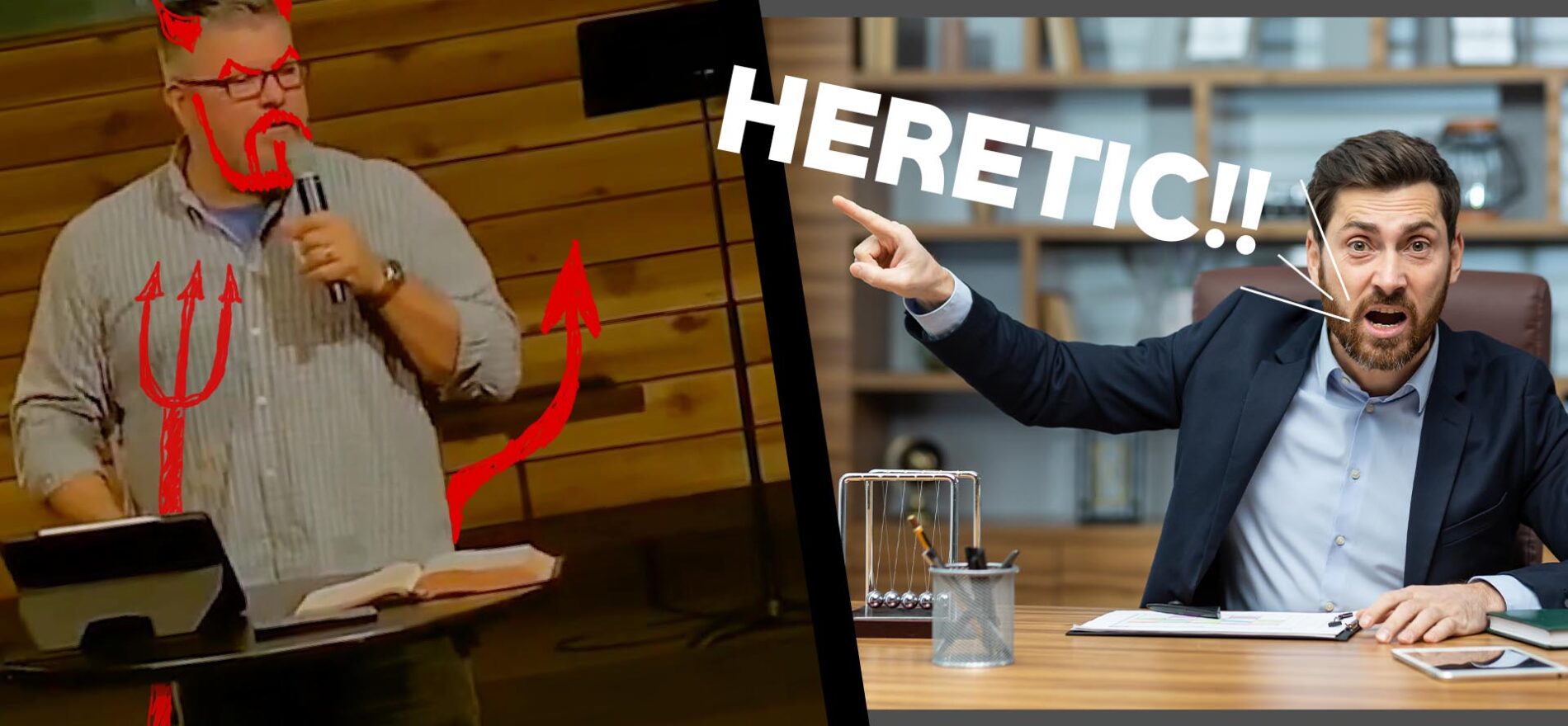Heresy!
It’s no secret to anyone who is active in the Christian social media world that there are “ministries” that live exclusively on YouTube who have dedicated their social media lives to hunting down those they consider heretics. They are self-proclaimed heresy hunters, and some of them are simply lone wolves with no outside accountability for their ministries. Some call their YouTube channels “discernment ministries” which is usually a softened title for a heresy hunter.
My question for us today is this: when should a person be labeled a heretic?
I’ll clue you in a little bit now. It’s not what you think.
Also, here’s a disclaimer. I used an image of me preaching in the graphic, but I want you to know that no one has actually called me a heretic. I’m just trying to avoid slander and not draw anyone else with devil horns and a pitchfork.
So, let’s lay out some terminology and then proceed.
The Greek word for heretic is hairetikos and Titus 3:10 contains the Bible’s only use of it, but it isn’t translated consistently in English. Many English translations render the Greek as divisive person. See Biblehub.com’s list of English translations.
As for a person who stirs up division, after warning him once and then twice, have nothing more to do with him,
– Titus 3:10 (ESV)
Logically then, a heretic is one who spreads heresy. What is heresy? The word heresy is derived from the Greek word hairesis. However, this word is more often translated as sect, faction, or party. Only once in the ESV (or thrice if you read KJV) is it translated as heresy. Strongs defines hairesis like this:
- g0139. αἵρεσις hairesis; from 138; properly, a choice, i.e. (specially) a party or (abstractly) disunion: — heresy (which is the Greek word itself), sect. AV (9) – sect 5, heresy 4;
- act of taking, capture: e.g. storming a city
- choosing, choice
- that which is chosen
- a body of men following their own tenets (sect or party)
- of the Sadducees
- of the Pharisees
- of the Christians
- dissensions arising from diversity of opinions and aims
So, here’s my synthesis of all this into a working, biblical definition for this article. A heretic is a person who intentionally creates division over differing opinions on various matters.
There are immediately problems with this, but not with the definition itself. The problem is how the word heretic is most often used. If you’ve followed any of the discernment ministries/heretic hunters, you probably understand that they have a much narrower use in mind. Many times heretic is employed to call someone a false brother or at least to insinuate that idea. In other words, they aren’t (likely) born again. These ministries apply that label to men and women who, by their estimation, have abandoned the Gospel and preached something else.
Clearly, I too would label someone who abandons the Gospel as a heretic. The question about these discernment ministries is whether they are justly saying these men and women have abandoned the Gospel. I’ve listened to these ministries on and off for a long time. I’m confident that some of them are so concerned with doctrinal purity and uniformity of belief that they’re ready to label anyone a heretic who strays outside of their lane.
I have no time for such “ministries” and if you listen to them, I humbly ask you to consider stopping. I’ll explain why before I’m done.
Let’s look at our working definition again.
A heretic is a person who intentionally creates division over their differing opinions on various matters.
The first noticeable thing about this definition is that it casts a wide net. It captures individuals who intentionally create divisions over… anything. By this definition, that deacon who split the church over the color of the carpet is a heretic. The men and women in the Corinthian church who were taking sides over their favorite teachers were heretics. But also, those false teachers and false prophets who divide the church over bad doctrine are heretics.
What does this all mean? It means that not everyone who is a heretic is a false brother. Some are, but not all. That means we need to sift through the catch in our wide net and determine heretics who are brothers and heretics who aren’t. Which ones are intentionally creating division over opinions, second or third-tier doctrines, or foundational beliefs? Why sift at all when Paul says have nothing to do with them? I think it’s important because it tells us how we call them to repentance. Some need to repent for salvation. Some need to repent for their ongoing sanctification.
Now notice that this is more than a simple disagreement. It’s an intentional power grab. Heretics are looking for followers, whether it’s over the color of the carpet or the virgin birth. And they work – at first under the surface – to gather people to their understanding. For example, in any given church there might exist different opinions on the end times. People naturally drift toward those who share similar thoughts on such matters. That’s fine and to a point completely understandable. But the moment someone draws a line in the sand and it becomes us and them, that person who drew the line is on track to become a heretic. Drawing hard lines in the sand over debatable matters is almost always a grab for power and control. That’s the work of a heretic.
Contrast that, to Paul’s admonition in Ephesians.
1 I therefore, a prisoner for the Lord, urge you to walk in a manner worthy of the calling to which you have been called, 2 with all humility and gentleness, with patience, bearing with one another in love, 3 eager to maintain the unity of the Spirit in the bond of peace.
– Ephesians 4:1-3 (ESV)
The worthy manner of conduct is humility, gentleness, patience, bearing with one another in love, and eagerness to maintain the unity of the Holy Spirit peacefully. Men and women who intentionally create division over non-essential matters are heretics. Paul instructed Titus that they get two strikes, then they’re out. Have nothing more to do with them. They are not walking in a manner worthy of the Gospel.
That leads me to one final thing before I’m done. Is there ever an appropriate time to intentionally create a division? I have to say, yes. Ask Martin Luther. While his hope was to reform the Roman church and not to create a new stream of the church, his actions nonetheless created a necessary and biblical division. There are doctrinal beliefs that demand the risk of division when there is fundamental disagreement. Like I said earlier, I would declare any professing believer who changes the Gospel, either by adding to or taking away from it, or abandoning it altogether, a heretic to be avoided.
The purity and simplicity of the Gospel are worthy of division.
So, what about these self-proclaimed heretic hunters with discernment ministries? Be careful. Some of them rightly call out people for abandoning the Gospel. Kudos to them. But I’ve found that many of them are creating intentional divisions around other beliefs like eschatology and spiritual gifts. Some create intentional division over things like whether Christians should let their kids participate in Halloween or whether they should watch Harry Potter movies. And others stir intentional divisions over political parties.
Many of these “heretic hunters” actually turn out to be heretics themselves. They create intentional division over differing opinions on various matters. They do not seek to maintain the unity of the Spirit in the bond of peace. At times they insinuate that people are false brethren for having a different understanding of a debatable matter.
Let me close with a confession and a plea. I confess that I have personally fallen into the trap of listening too much to heresy hunters. I have even posted on this blog about how I’m drawing a line in the sand with Bethel Church in Redding, California, and posted a video from Mike Winger as my source of information. I confess this to you because I recognize how easy it is to just listen to other voices for discernment instead of relying on the Holy Spirit. Mike Winger is an excellent apologist and I have respect for him, but he should never be my final say on any matter. The final say belongs to the Word and the Spirit.
By the way, I do not believe Mike Winger is a heretic by the definition we’ve established. In everything I’ve ever watched from him, he demonstrates precisely what Paul instructed us to do in Ephesians 4:1-3. He conducts his ministry in a manner worthy of the Gospel, which is decidedly unheretical.
I plead with you, don’t fall prey to heretics. Stop giving them an ear and do as Paul told Titus. Have nothing more to do with them. If you have a disagreement with a brother, don’t go study up with YouTube discernment ministries. Instead, sit down with your brother, your Bible, and hear them out. Be humble, gentle, patient, and bear with one another in love. You don’t have to have all the answers. Go ask your pastor if you need help understanding something. Don’t rely on a talking head on YouTube who claims to have a discernment ministry who knows neither you nor the person with whom you’re differing. Don’t draw hard lines over debatable matters.
Don’t become a heretic.





